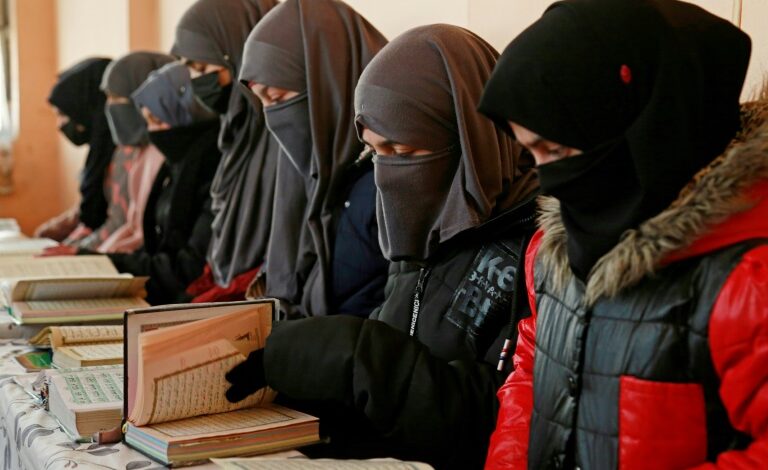Afghan Girls Turn to Madrassas for Education Amidst School Bans

In a stark response to the educational restrictions imposed by the Taliban regime in Afghanistan, girls in the country are increasingly seeking refuge in madrassas to continue their pursuit of knowledge. While these Islamic religious schools offer a lifeline for girls eager to learn, experts caution that such education can never fully replace the comprehensive and diverse learning opportunities available during the previous US-backed Afghan government.
Since the Taliban’s seizure of power in August 2021, the group has systematically curtailed access to education for girls and women, effectively banning them from schools and universities. Initially, the Taliban’s rhetoric suggested a level of leniency towards women’s education, but this facade quickly crumbled as they reneged on their promises.
Under the current Taliban regime, girls above Grade 6, typically aged 11 and 12, are permitted to study in religious schools, known as madrassas. For many of these girls, attending madrassas is not a choice but rather the only option for pursuing any form of education.
Munira, a 16-year-old student in Kabul, shared her experience of joining a madrassa just a month ago. She expressed her happiness at being able to study the Quran and engage in religious discussions. However, Munira’s dreams extended far beyond religious studies; she harbored aspirations of becoming a doctor. The abrupt closure of her previous school two years ago left her shocked and grappling with limited educational opportunities.
The plight of Afghan girls seeking education in madrassas is part of a broader crisis in the country. A UNESCO report released earlier this year exposed the dire educational situation for Afghan girls and young women. Alarmingly, approximately 2.5 million Afghan girls and young women found themselves excluded from the formal education system. This staggering number constitutes 80% of the age group.
Even more distressing is the revelation that 1.2 million of these girls were denied access to secondary and university education due to the harsh policies of the Taliban regime. The dire situation prompted the Afghan Ministry of Education to open its doors to older girls, with more than 20,000 of them opting to study in government-run madrassas. In total, an estimated 95,000 girls and young women are currently enrolled in these religious schools, their educational hopes and dreams restricted by circumstances beyond their control.
The turn to madrassas represents a mixed blessing for these young girls. While these Islamic institutions offer an opportunity to continue their education and engage in religious studies, they fall far short of the holistic education that was previously available. In the past, Afghan girls had access to diverse subjects, including sciences, humanities, and vocational training, which prepared them for a wide range of careers and contributions to society.
The limited curriculum in madrassas primarily focuses on religious teachings, leaving little room for the development of essential skills and knowledge in other areas. This narrow educational scope may hinder the girls’ future prospects and limit their contributions to rebuilding their nation.
As the international community closely monitors the evolving situation in Afghanistan, it remains evident that the right to education, especially for girls and women, is under severe threat. The challenges faced by Afghan girls seeking education in madrassas underscore the urgent need for concerted efforts to ensure that all children, regardless of gender, have access to quality education.
While madrassas serve as a temporary refuge for some, they cannot be a substitute for a well-rounded education that equips young girls with the knowledge and skills needed to thrive in an increasingly interconnected and complex world. The international community, along with civil society organizations, must continue advocating for the restoration of inclusive and comprehensive education in Afghanistan, one that empowers girls to pursue their dreams and contribute to the nation’s progress.
News Mania Desk / Agnibeena Ghosh 5th September 2023






